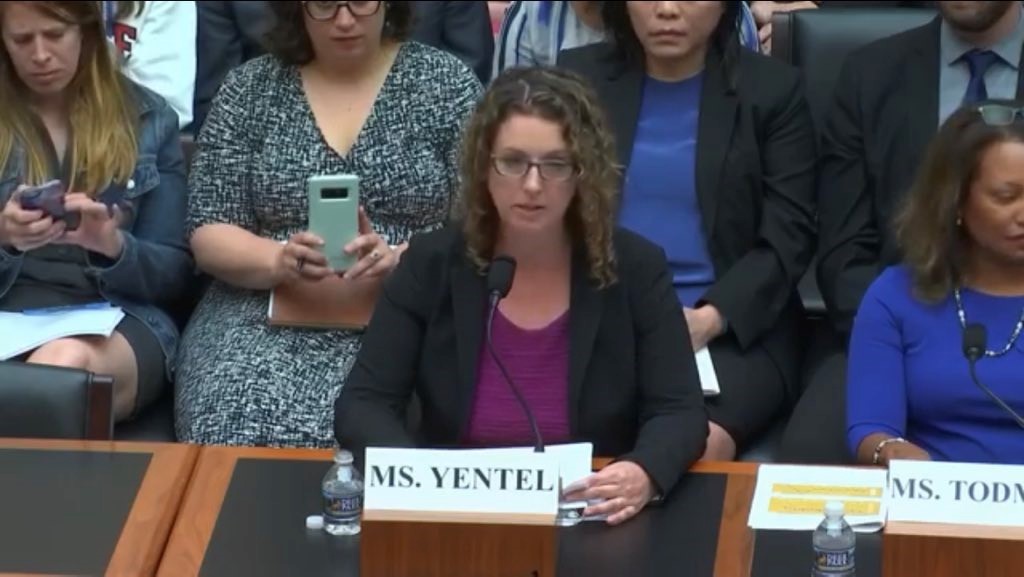The House Financial Services Committee held a hearing on April 30 to assess the infrastructure needs of America’s housing stock. Witnesses included Diane Yentel, NLIHC president and CEO; Adrianne Todman, CEO of the National Association of Housing and Redevelopment Officials; Steven Lawson, chairman of the Lawson Companies and representative for National Association of Home Builders; and Daryl Carter founder, chairman, and CEO of Avantha Capital and representative for the National Multifamily Housing Council and the National Apartment Association. Diane highlighted the need for significant additional federal investments to build, repair, rehabilitate, and preserve homes for those most in need. Watch Diane’s opening statement at: https://bit.ly/2H64kun Read her written testimony at: https://bit.ly/2WiqDlC

Chair Maxine Waters (D-CA) cited NLIHC research in her opening statement, noting there is a shortage of more than 7.2 million rental housing units affordable and available to the lowest income families. As part of the hearing, Chair Waters released legislation, the “Housing is Infrastructure Act of 2019,” that would invest $5 billion in the national Housing Trust Fund (HTF), $70 billion to address the public housing capital backlog, $1 billion for the Native American Housing Block Grant, $1 billion for rural housing, and $10 billion in competitive Community Development Block Grants.
In response to a question from Representative Sylvia Garcia (D-TX) about providing housing for the lowest-income people in America, Diane discussed the successes of the national HTF as the nation’s most deeply income-targeted housing program: “The first year’s allocation of $174 million resulted in about 1,900 units that have been developed that are housing some of the country’s most vulnerable people.” Diane noted that the program is woefully underfunded compared to the overwhelming need, making an infrastructure package an ideal opportunity for additional investment.
Representative Jesús García (D-IL) discussed the challenges of gentrification and displacement in the Chicago metro region, telling the committee that, according to NLIHC’s analysis, fewer than 1 in 3 low-income renters have access to affordable, available homes in his district. Diane explained that the HTF was designed exactly to meet that need, a need that “exists in every Congressional district whether they are rural, suburban, or urban. The primary cause of the affordable crisis we have today is the shortage of homes affordable and available to the lowest-income people…All of the funding [for the national HTF] goes to states in order for them to get the funds out to developers to build and preserve apartments for the lowest-income people.” All the witnesses agreed that public subsidies were necessary to build affordable housing and that private investments alone were insufficient. Watch Representative García’s questions and Diane’s answers at: https://bit.ly/2WujEX8
Representative Ayanna Pressley (D-MA) made the case for investing in housing infrastructure by calling attention to the relationship between housing conditions and public health outcomes, sharing evidence from her state. Diane agreed, noting that “when people are affordably housed, their visits to primary care physicians increase by 22%, visits to emergency rooms decrease by 18%, and Medicaid costs fall by 12%. . . . We will spend $111 billion in avoidable health care costs because of housing instability and insecurity.” Watch Diane’s exchange with Representative Pressley at: https://bit.ly/2vMyc8t
Many Republican representatives agreed that housing is an important part of a community’s infrastructure, and they focused their statements and questions on ways to reduce regulatory burdens and to better pair private and public capital to address the problem.
Learn more about the hearing at: https://bit.ly/2IEkb5w
Watch Diane’s interactions with Representatives Ann Wagner (R-MO), Nydia Velázquez (D-NY), and Ocasio-Cortez (D-NY), as well as the full hearing, at: https://bit.ly/2ZXtuTc
